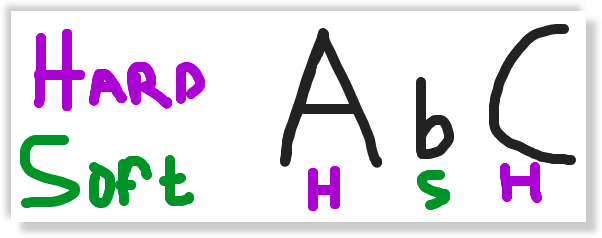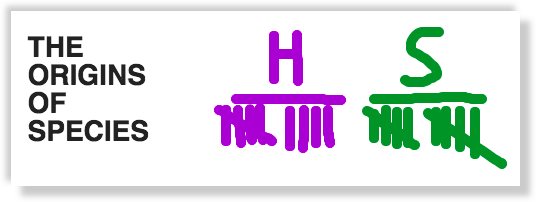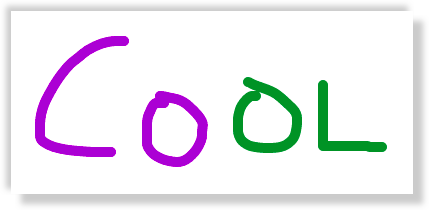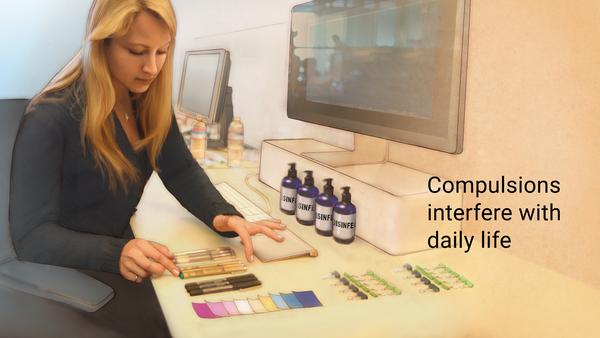this is part 2 of a series on mental disabilities – for more, check out Tourette’s and Insomnia.
i didn’t know my brain worked differently until MTV’s “I Have OCD.”
until my early teens i assumed everyone played dozens of mind games throughout the day to cure boredom.
what OCD is not
before getting into the thick of my condition, let’s chat about folks who pretend to have OCD, but don’t.
here’s a normal conversation with a college student, struggling to “find themselves” and stand out from the crowd:
**doing homework**
friend: tosses papers on the table
student: re-arranges paper stacks to have straight edges
friend: “why did you do that?”
student: “haha sorry, i can’t help it, i have OCD.”
fail.
i’ve never met an OCD-diagnosed person who does this. perhaps in private, and maybe for something as mundane as stacks of paper, but they wouldn’t laugh-apologize for it.
the laugh-apologizer is a wannabe who mistakes OCD as a brand of “perfectionism.”
because for those with an ignorant understanding of obsessive compulsive disorder, the sole assumed side effect is “giving order to unordered objects.” and who can’t benefit from more order in their lives?
while this is partially true, OCD specifically causes those afflicted to grant order to things undeserving of order. to be subservient to rules and hierarchies that don’t exist. to believe, viscerally, that not following these rules will cause harm. or maybe worse.
let’s instead consider OCD like we consider all mental and physical characteristics… it can embarrass or empower. it can make us lethargic or amplify ambition.
recognizing OCD
i’m not quoting scientific journals because this is my blog, and i’ll describe myself however the f*** i want.
but there are 2 ways we can disseminate various flavors of OCD in the wild…
- external
- internal
External OCD is what television oft highlights… excessive hand-washing, stepping through doorways 8 times, etc.
this is similar to Tourette’s:
mental anxiety compulsions
irrational belief life will suck if compulsion disobeyed
extra hand-washing
we can watch funny YouTube videos (be honest, they’re funny) where sufferers of External OCD will outline their mental patterns leading to physical behaviors, in the cycle i’ve mapped above.
but what’s more interesting is Internal OCD, commonly referred to as “magical thinking.”
magical thinking
i’ll admit — i’ve always resonated with Special Ed kids.
my exposure is limited, but i’ve had the opportunity to observe and read about:
- how they perceive their surroundings
- which events they understand to be correl vs causal
- sources of their anxiety and mood swings
although obviously not on their level, i feel comfortable claiming some similarities with special people, namely in how we process the mundane.
those of us with Magical Thinking contort everyday objects, ideas… even sentences on a page, into complex and sometimes superstitious forces.
this leads to stress, seemingly short attention spans, and “quirks” in behavior or speech articulation.
in the following sections i’ll share the inner workings of my own Magical Thinking, paired with visualizations to help you understand and [possibly] appreciate what goes on in the mind of an OCD-er.
getting started with magic numbers
there are 26 letters in the English alphabet. every letter is assigned a number. A is 1, B is 2, C is 3, and so forth.

but something is missing… you see, odd numbers are “hard” and even numbers are “soft.”

therefore, when pronouncing letters in our head or with our mouth, we add emphasis to the hard letters, making them LOUDER and the soft, odd letters quieter.
forming words with magic letters
annunciating the word “hi” is pretty simple. in slow motion, the word sounds like:
huh-EYE
we inflect up and increase volume on the end of the word, because the letter ‘i’ is odd, therefore HARD.
let’s try another one, “hello:”
huh-EH-luh-OH.
but this isn’t quite right. because for every 2nd appearance of a letter, it’s intonation (hard/soft) is reversed.
thus, the first 3 letters of “hello” — ‘h’, ‘e,’ and ‘l’ — are pronounced soft, LOUD, soft. and when we arrive at the 2nd “L”, this otherwise soft, even letter is now hard, and pronounced “LUH”.
with that in mind, the correct pronunciation of “hello” is…

have you ever heard a special person intonate a word with mid-syllable inflections?
compulsive counting sentences
we’re in school. class is boring but difficult.
a presentation slide displays on the screen, with a 5-7 word headline.
instead of listening to the professor, we analyze what it says:
The Origins of Species

counting the number of hard and soft letters, there are 9 hard, 10 soft.
(remember, the first “O” in “Origin” is hard, but the 2nd “O” in “Of” is soft. similarly, the first “I” is hard, second “I” is soft, and 3rd “I” (end of ‘Species’) is hard again.)
unfortunately this is not OK.
the quantity of hard and soft letters must be equal.
there are a couple tricks we can leverage to “equalize” a word or sentence, so that we can resume class notes, read the next road sign while driving, etc.
magic thinking hacks
with 19 total letters in our classroom presentation slide, we might wonder “how could they ever be equal?”
introducing: the sp ace.
if we consider again our slide, there are 3 spaces, which can be filled like so:
The[s]Origins[h]of[h]Species
this gives us 11 hard and 11 soft characters — exactly what we need.
but wait.
spaces work the same as letters… sort of. yes, spaces are wildcards, and we can make them hard or soft, pending our needs. but they can’t be abused.
we can’t make every space hard or soft.. there must be balance here, too.
so let’s add punctuation.
The Origins of Species. (<-- note the period)
with 19 letters, 1 special character (period), and 3 spaces, we can now:
- assign the period — also a wildcard — to HARD
- add a single space after the period, and assign it soft
this produces 11 + 11 hard/soft characters, and 2+2 hard/soft spaces.

equalization lifestyle
i wake up like this: analyzing sentences when my mind lulls, to check for and make “right” the hard and soft characters from which it’s made.
this takes a toll on coursework, long conversations with girlfriends, and movies with captions. because sometimes, the words don’t equalize.
adding wildcards (spaces, commas, and periods) doesn’t always correct the words. sometimes, the sentence needs more.
in these scenarios i add filler words, like “ha” and “okay,” followed by additional spaces and periods, all the while keeping note of when each wildcard and character needs to be reversed, until the equalization is complete.
and it’s not even lunch yet.
while concentration deters this analysis, there’s a “B-side” to magical thinking that resides in my brain power’s free time.
a few examples:
- equalizing my entire body… accidentally pat my right hip while walking? slap my left hip
- setting car stereo or television volumes to an even number, ie 20 vs 21
i’m grateful these ailments require less voluntary energy to sustain (obey?) than letter counting, and occasionally i “spite” a given compulsion as a kind of DIY Exposure Therapy.
benefits of OCD
at the risk of sounding masochistic, obsessive compulsive disorder isn’t all bad.
beyond the ability to write a 1,300 word self-deprecating blog post, i believe OCD makes me a more meticulous person, granting the propensity to pay greater attention to detail in software development projects or user experience design.
and on the creative side i think OCD benefits musicians, because it equips us with built-in pattern recognition hardware (drum beats, musical composition) that most people only learn through voluntary repetition.
treating OCD
i have no intention to “fix” or curb my compulsions.
sure, they make me a particular and sometimes peculiar person.
but that’s often why i was hired over somebody else.
that’s why i enjoy public speaking and making eye contact with strangers. it’s how i know the drum beat to 100+ Blink 182 songs, without even owning a drum kit.
“Today you are You, that is truer than true. There is no one alive who is Youer than You.”
–Dr. Seuss
